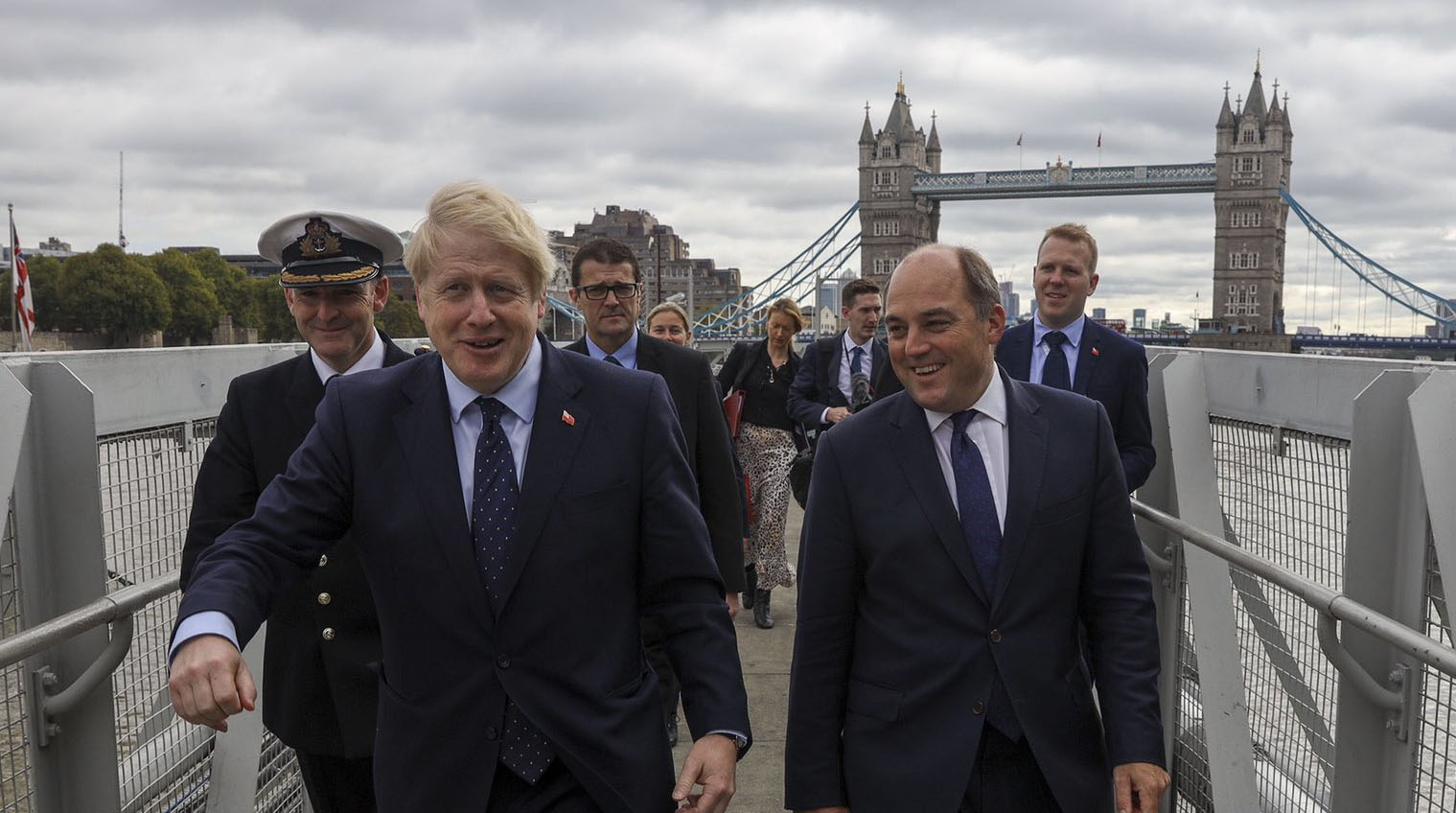The Royal Navy’s role in the world’s worst humanitarian disaster has emerged after freedom of information requests by Declassified found extensive evidence of UK support for the Saudi-led sea blockade of Yemen.
Aid agencies have repeatedly condemned the naval embargo on Yemen’s Red Sea coast, which UN experts have described as violating international humanitarian law. Human Rights Watch says the blockade has “severely restricted the flow of food, fuel, and medicine to civilians” during the last five years.
War broke out in March 2015 when Saudi Arabia and its allies began attempting to dislodge Houthi rebels from Yemen’s capital. The fighting was so ferocious that the head of the International Red Cross, Peter Maurer, warned: “Yemen after five months looks like Syria after five years.”
Describing the situation as “catastrophic”, Maurer said: “This cannot go on. Yemen is crumbling. As a matter of urgency, there must be free movement of goods into and across the country. Deliveries of food, water and medicine should be facilitated.”
Days after Maurer’s warning in August 2015, the Saudi-led coalition bombed Hodeidah, one of Yemen’s largest ports, and destroyed a series of cranes used for unloading vital food aid. Save the Children said the port bombing was “the final straw” for innocent civilians.
Despite this attack, Declassified has found that in September 2015 – the month after the Hodeidah docks were hit – a naval officer from the United Arab Emirates (UAE) was invited to HMS Collingwood near Portsmouth in southern England to attend a four-week course teaching skills that could be used for blockading Yemen.
Sessions included “counter-smuggling”, “board and search” and using aircraft to support an “Exclusive Economic Zone” (EEZ) – the area of water that extends 200 miles off a country’s coast containing its fishing and resource rights.
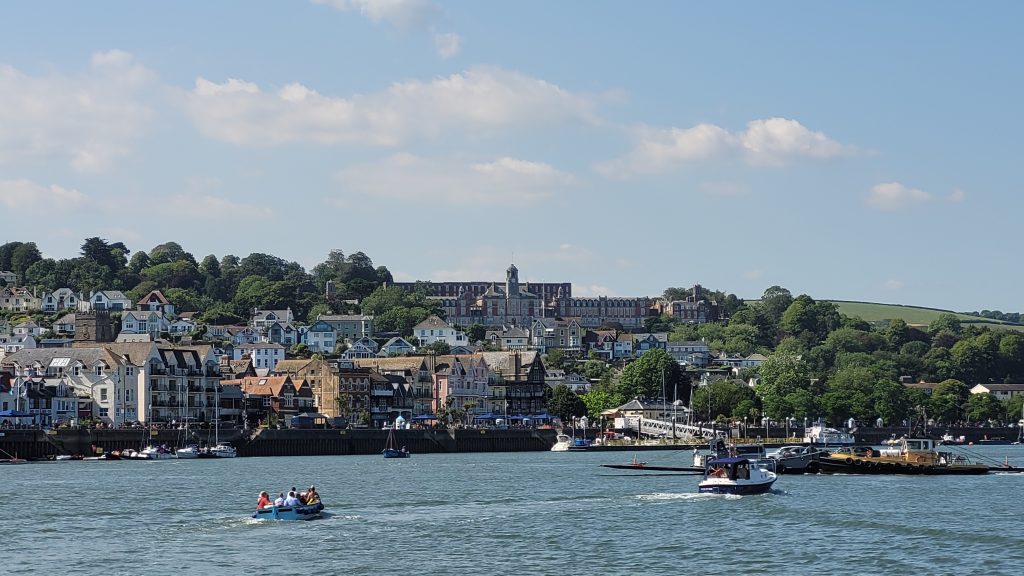
The UAE has one of the most powerful navies in the region and has played a key role in the sea blockade. At the start of the conflict it built a military base at Assab on the coast of Eritrea, a highly repressive country which the Economist has dubbed “Africa’s North Korea”. The move gave the UAE navy access to a deep-water port directly overlooking Yemen.
Then in December 2015, the son of the Crown Prince of Bahrain – another key country in the coalition – graduated from the Royal Navy’s officer academy in Dartmouth, south-west England. His father, Prince Salman bin Hamad Al-Khalifa, watched the graduation ceremony as a guest of honour.
Some sources suggest that Bahrain’s small navy has contributed to the sea blockade and Bahraini soldiers are known to have died fighting in Yemen. UK ministers are currently forbidden by a court ruling from allowing new arms exports to Bahrain for possible use in Yemen.
Al-Khalifa’s visit to Dartmouth was followed in March 2016 by Royal Navy officers spending a week in Saudi Arabia training 15 sailors how to “board and search” vessels in “international waters or territorial seas”.
According to a Royal Navy brochure, the course focused on “reducing unnecessary risks to the Boarding Team while maximising use of effective law enforcement”. Topics included detention procedures and “high risk search techniques” as well as international law.
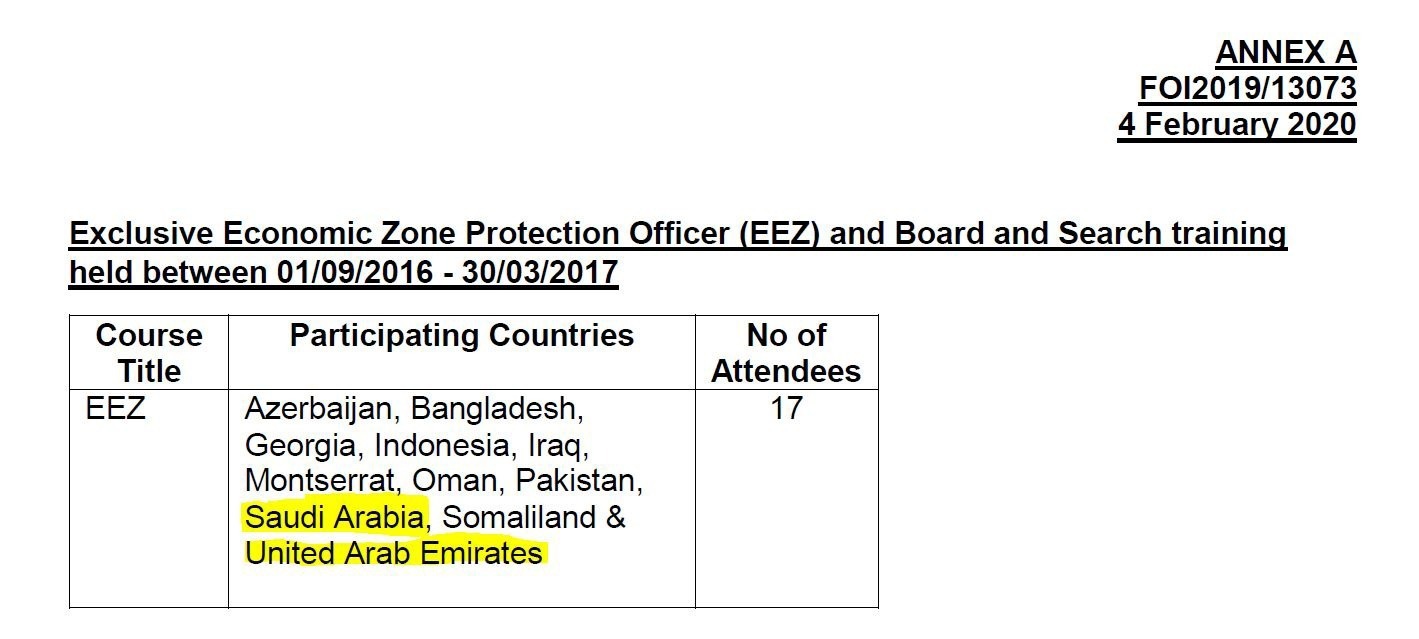
The Royal Navy then provided an “Exclusive Economic Zone Protection Officer course” to Saudi and UAE personnel between September 2016 and March 2017, followed by mobile sea training with the Saudi Navy.
Andrew Smith from Campaign Against Arms Trade (CAAT) told Declassified: “The Saudi-led coalition has shown a total disregard for international law and Yemeni lives. Its devastating and immoral blockade has only served to punish Yemen and exacerbate the crisis. It has killed a huge number of people by stopping vital supplies from reaching those that need it.
“This training is symptomatic of the toxic and dangerous relationship between the UK Government and the Saudi-led forces. The UK should be condemning the atrocities that have been inflicted by the Saudi naval forces and their coalition partners. It definitely should not be arming, training and conspiring with those that are responsible for such a callous act.”
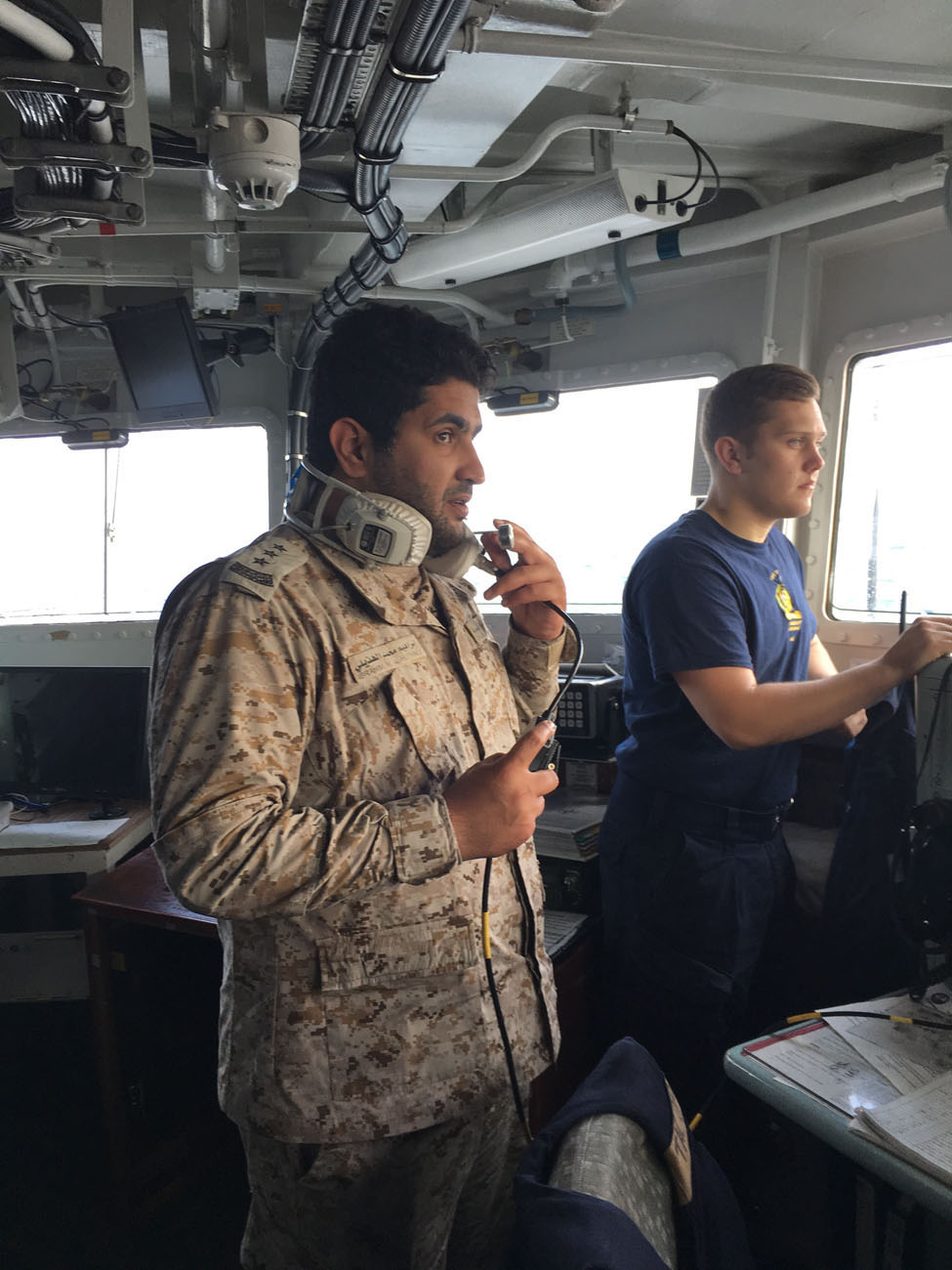
‘Paralysing a nation’
British training has not stopped its partners from conducting atrocities. In March 2017, 32 refugees were killed when their boat was shot at by a helicopter off the coast of Yemen. Human Rights Watch believes the incident was probably a war crime and has attributed it to the Saudi-led coalition, as it is the only side in the conflict to possess such aircraft.
By this stage, the UN’s special rapporteur on human rights and sanctions, Idriss Jazairy, was warning that the blockade was “paralysing a nation” with seven million people facing famine. Jazairy said that the naval blockade amounted to “an unlawful unilateral coercive measure under international law”.
The Royal Navy continued working with coalition members before and after this warning, including with Bahrain where it has a permanent base. Between 2015 and 2018, British marines held three military exercises in Bahrain — known as “Pearl Dagger” — where they spent nearly a month at a time training their counterparts in live firing, close-quarter marksmanship and battle tactics.
Sayed Ahmed Alwadaei from the Bahrain Institute for Rights & Democracy (BIRD) called the training “shameful and abhorrent”. He commented: “In return for providing the UK with a naval base in Bahrain, the government is facilitating an unprecedented humanitarian catastrophe” in Yemen.
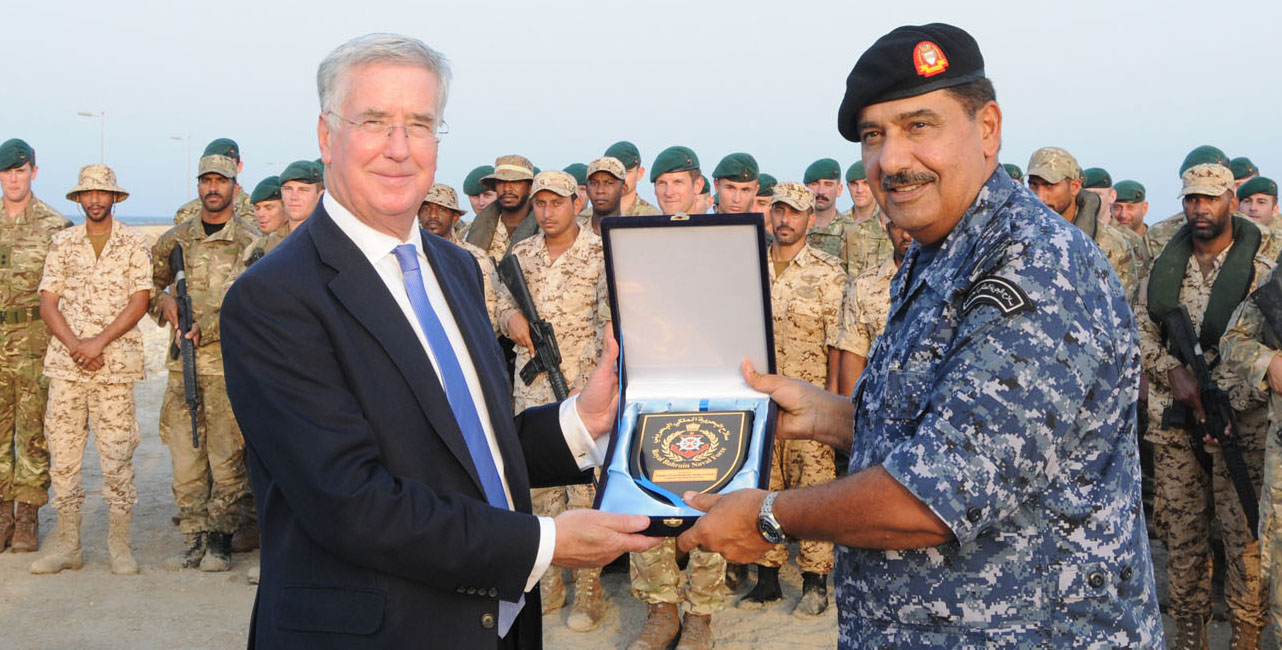
By 2019, five years of fighting and blockade had left nearly 10 million Yemenis “one step away from famine”, according to the UN’s World Food Programme. UNICEF called on all warring parties “to allow humanitarian deliveries to children and their families wherever they are in the country”.
The UK government appeared to recognise these concerns, with an aid minister telling Parliament: “It is absolutely vital that Yemen is kept open to humanitarian access and commercial supplies and personnel, upon which the Yemeni population depend.”
The minister also stated that “we are raising the importance of these points at the highest levels”. However, the Royal Navy continued to deliver further training in skills that could help to maintain the blockade.
The UAE navy received lessons in how to “board and search” vessels during 2019, and a UAE naval officer attended an “international electronic warfare manager” course at HMS Collingwood. Meanwhile nine Saudis along with cadets from Bahrain, UAE and Egypt attended the Royal Navy’s officer academy at Dartmouth.
Nearby on England’s south coast at Lympstone, an unspecified number of commandos from the UAE went on the 60-week Royal Marines young officer course, which included training on “amphibious and helicopter operations”.
In September 2019, UK trade secretary Liz Truss had to apologise for accidentally allowing the export of security equipment to the UAE Navy, in breach of a court order in June 2019 to halt new arms exports which the coalition could use in Yemen. Between the blockade starting and that court ruling, the UK licenced the export of £42-million-worth of warship equipment to the UAE and £10-million-worth to Saudi Arabia.
In addition to delivering courses and military equipment, the Royal Navy has five sailors – including a Lieutenant Commander – on loan permanently to the Saudi Navy.
Declassified has found that three of the team are listed as instructors, meaning that they can provide full-time training at the King Fahd Naval Academy at Jubail on the Gulf coast, where they are stationed. Britain’s largest arms company, BAE Systems, also has a contract to train the Saudi navy.
Amnesty International told Declassified: “Given the Saudi Arabia and UAE-led military coalition’s bloody record over civilian deaths in Yemen, it’s deeply concerning that the Royal Navy and Royal Marines thought it right to continue with these training programmes regardless”.
Amnesty’s UK security programme director Oliver Feeley-Sprague said: “At the very least, these programmes should have been paused following last year’s Court of Appeal ruling, under which the UK was supposed to halt arms sales to the Coalition.”
“Whether it’s the Saudi or Emirati militaries, or police forces in Hong Kong or the USA, the UK is dangerously cavalier over who it sells its arms and security equipment to, while providing a range of training to military and security forces with extremely troubling human rights records.
“We need to see the UK adopting a more responsible and more proactive ‘risk-mitigation’ approach to both its arms sales and its training programmes.”
An MOD spokeswoman told Declassified: “We have an ongoing and wide-ranging defence engagement relationship with Saudi Arabia, which has included the provision of training courses and advice and guidance in the UK and Saudi Arabia. The training provided also covers International Humanitarian Law. All UK military personnel in Saudi Arabia are under UK command and control.”
Since launching less than a year ago, Declassified’s small team of journalists has revealed significant new information about Britain’s war in Yemen, including:
- A secret British army unit permanently based in Saudi Arabia advised Riyadh on military operations along the border with Yemen.
- Censorship of high-level Cabinet papers about the UK’s special relationship with Saudi Arabia.
- A weekly BAE Systems resupply flight from its Typhoon factory in England to a front-line Saudi airfield, via an RAF base in Cyprus.
- British government officials failing four times to conduct arms export inspections at BAE and Raytheon factories in the UK.
- RAF training for hundreds of Saudi military personnel at six air bases in England and Wales in 2019.

